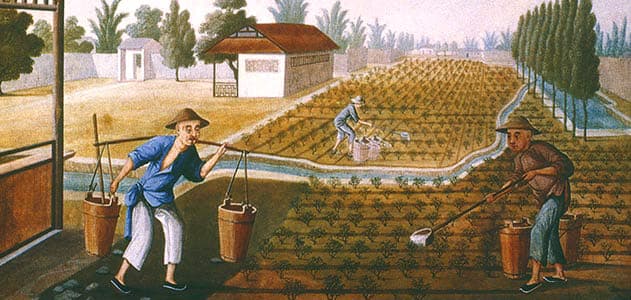Tea has been known to mankind for many millennia. Ancient Chinese sources testify that even 2700 years before Christ, people in the Celestial Empire were familiar with this wonderful drink. Many researchers agree that China is its birthplace. Numerous legends have been formed around the origin of tea, and perhaps some of them are not far from reality.
Legends about the birth of the drink
One of the most famous stories involves a scholarly monk, Tzai-ye, who is said to have cut off his own eyelids in order not to fall asleep while working on important works. The eyelids, thrown on the ground, sprouted into tea-like cilia. There is also a legend about the wise ruler Shen-Nung, who lived in 2737 B.C. He ordered to boil water for the health of his subjects. One hot day, a few leaves from a nearby shrub fell into a pot of boiling water; when Shen-Nung tasted the resulting decoction, he noted its extraordinary flavor and strength.
Distribution in China and beyond
As tea bushes began to be cultivated on plantations (around the 3rd-4th centuries AD), China not only strengthened its tea drinking culture, but also became a monopoly in tea leaf production. Gradually, this beverage conquered the countries of the East and later reached the West. However, the Chinese, sophisticated in tea traditions, believed that the true art of drinking tea remains known only to them: for the people of the Celestial Empire tea has long become a special cultural phenomenon with more than five millennia of history.
Tea as a medicine and the modern view
Originally, the leaves were brewed rather for medicinal purposes, perceiving the drink as a powerful tonic. The Chinese Taoists used it to maintain mental clarity during spiritual practices. The tea leaf infusion was believed to help maintain vigor and organize thoughts.
Modern scientific research confirms that tea is indeed rich in beneficial substances. Non-fermented varieties (such as green tea) retain high levels of amino acids and vitamins (including the rare vitamin P). It is also high in antioxidants – so-called catechins, which help the body fight free radicals and, according to some reports, reduce the risk of a number of diseases. Scientists continue to study the beneficial effects of tea on the cardiovascular system, brain function and immunity. They especially note the high vitamin C content in fresh tea leaves – several times higher than in citrus fruits.
Conclusion
The history of tea is a path from the most ancient Chinese legends to a global beverage honored on all continents. For hundreds of years, mankind has discovered ever new ways to grow the tea bush and perfect brewing rituals. In the East, the culture is steeped in philosophy and elaborate ceremonies, while in the West, tea has adapted to local traditions. And although the Chinese with many thousands of years of experience believe that the West has only opened the veil of tea mastery, modern research proves the universal health benefits of this beverage. Tea has long outgrown its status as a “divine decoction” and has become an integral part of the world’s heritage, while remaining a source of flavor, energy and inspiration for millions of people.

